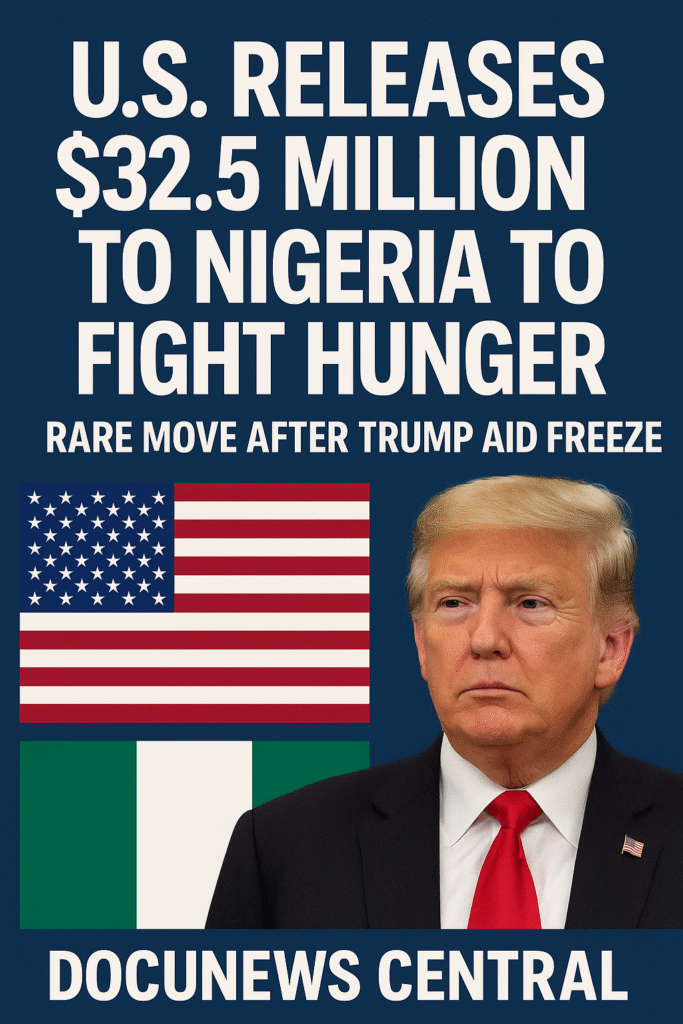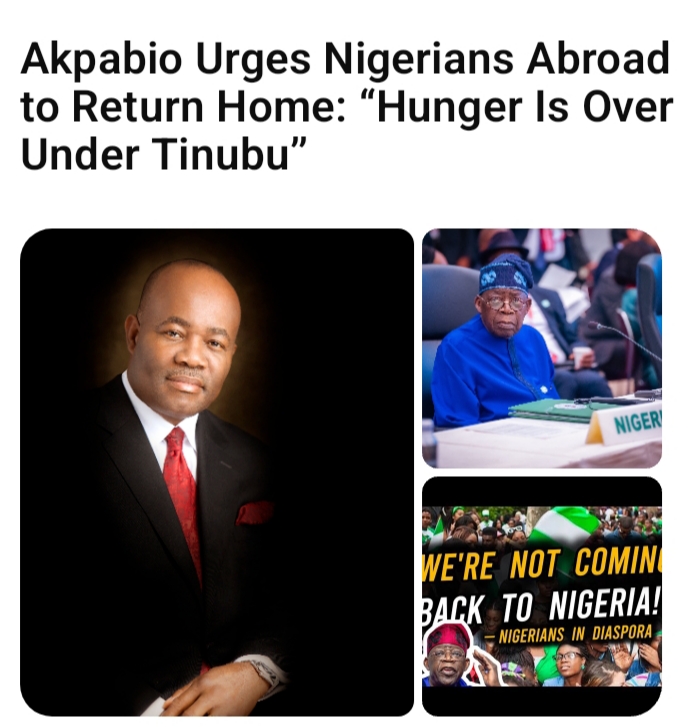
U.S. Releases $32.5 Million to Nigeria to Fight Hunger — Rare Move After Trump Aid Freeze
DocuNews Central | Breaking News Report
A Big Shift in U.S. Policy
The United States has approved $32.5 million in aid for Nigeria to fight hunger. The support comes at a time when millions of people in Nigeria are facing food shortages, malnutrition, and rising prices. This move is seen as rare because former U.S. President Donald Trump had earlier suspended most foreign aid programs under the U.S. Agency for International Development (USAID).
The announcement is one of the most talked-about global aid stories of 2025. Many experts say it shows a turning point in U.S. foreign relations with Africa. For Nigeria, the funds are expected to bring relief to communities badly hit by food insecurity.
Why the Money Matters Now
Nigeria is facing a deep hunger crisis. Millions of families in the northern part of the country, especially in Borno, Yobe, and Adamawa states, are struggling. Armed conflict, poor harvests, floods, and high inflation have made food scarce.
The new funding will help over 764,000 people, including vulnerable groups such as pregnant women, breastfeeding mothers, and children under five years old. Many of these people live in camps for displaced persons, where food supply is unstable.
According to U.S. officials, the money will be used to provide food vouchers, nutritional supplements, and cash transfers. This support is meant to reduce child deaths, improve health for mothers, and give families direct access to food in local markets.
Trump’s Suspension of USAID
The aid package is striking because it comes after Donald Trump, who returned to power in January 2025, issued Executive Order 14169. That order froze nearly all foreign development programs run by USAID.
The freeze lasted for 90 days and was later extended in different forms. It led to cuts of over 90% of USAID contracts, causing shockwaves in many countries that depended on U.S. support. Health projects, education programs, and long-term development aid were shut down or left incomplete.
While emergency humanitarian programs were allowed under special waivers, the majority of foreign assistance remained frozen. That is why the Nigeria package of $32.5 million is viewed as a rare exception to Trump’s strict policy.
What the U.S. Said
In a statement, U.S. officials explained that the funding was approved because of the urgent scale of hunger in Nigeria. They noted that ignoring the crisis could lead to more deaths, social unrest, and even security risks that may spill beyond Nigeria’s borders.
The officials also said the money would be closely monitored to ensure it reaches the right people. They promised transparency and regular updates to both the Nigerian government and the U.S. Congress.
Nigeria’s Response
Nigerian officials welcomed the aid package, calling it a lifeline. A spokesperson for the Ministry of Humanitarian Affairs said the money would help address food gaps, especially in the northeast, where fighting with insurgent groups has displaced thousands.
Local NGOs and humanitarian partners also expressed relief. For months, they had warned that funding shortages were forcing them to scale down their programs. With the U.S. injection, some of those operations will now resume.
Hunger in Numbers
The scale of hunger in Nigeria is huge:
Over 26 million Nigerians are projected to face crisis or worse levels of food insecurity in 2025.
Over 2 million children under five are at risk of severe acute malnutrition.
Prices of food staples such as rice, maize, and beans have doubled in the past year.
Conflict in the northeast continues to block farming and food transport.
This crisis is part of a wider global hunger problem. Experts say climate change, war, and economic shocks are making food insecurity worse worldwide.
Why This Aid is Rare
Observers note that the decision stands out because Trump has maintained a hard stance against foreign aid. His administration argues that U.S. taxpayers should not fund other nations when there are problems at home.
However, the Nigeria case shows that humanitarian emergencies may force exceptions. Analysts suggest that the White House wanted to avoid a major international outcry if Nigeria’s hunger crisis grew worse.
Still, some see the move as political. Nigeria is Africa’s largest economy and one of its most strategic nations. U.S. policymakers may view supporting Nigeria as a way to maintain influence in Africa, especially at a time when countries like China and Russia are increasing their presence on the continent.
Voices from the Ground
Aid workers in Maiduguri, the capital of Borno State, say the funding is a welcome relief. One staff member of a local NGO told DocuNews Central:
“We have been struggling to feed displaced families. Some days, food rations are cut in half. This money means fewer children will go to bed hungry.”
Mothers in the camps also expressed hope. A young woman caring for three children in Bakassi IDP camp said:
“I lost my farm to floods. I have no job. We live only on aid. If this support comes, we will survive.”
Critics Speak Out
Not everyone is happy. Some U.S. lawmakers critical of foreign spending argue that the $32.5 million could be used at home. They say American families are also struggling with high prices and need more government help.
Others worry about corruption and misuse. Nigeria has a history of weak systems in aid delivery, and critics fear that money may not reach those most in need.
Possible Benefits for Nigeria
If well managed, the aid could:
Reduce hunger and malnutrition deaths.
Stabilize communities affected by war and floods.
Boost local food markets, since vouchers and cash transfers often support local farmers.
Strengthen U.S.–Nigeria ties, opening doors for more international support.
Risks and Challenges
But risks remain:
Insecurity in northern Nigeria may block aid delivery.
Poor monitoring could lead to diversion of funds.
If U.S. policy shifts again, future funding may not continue.
Hunger needs are far larger than $32.5 million, so the package may only cover a fraction of the crisis.
Aid Beyond Nigeria
The U.S. has also been under pressure to release aid for other countries facing food crises, such as Sudan, South Sudan, and parts of the Sahel. Humanitarian groups say global needs are rising fast, but funding is shrinking.
The Nigeria case may serve as a test of whether more exceptions will be made under Trump’s aid freeze.
Global Attention on Africa
Africa has become a battleground for international influence. While the U.S. reduces aid, other nations are increasing their role. China invests heavily in infrastructure, while Russia has built ties through military support in countries like Mali and the Central African Republic.
Analysts say the U.S. does not want to lose Nigeria, Africa’s largest population and a key oil producer. By releasing this aid, Washington may be signaling that it is still committed to supporting Africa in times of crisis.
What Comes Next
For now, Nigeria is expected to begin receiving the funds through international partners in the coming weeks. Distribution will start in the northeast before expanding to other high-risk areas.
Humanitarian agencies hope the aid will prevent a major famine. But they stress that long-term solutions—such as improving farming, reducing conflict, and building resilience against floods and droughts—are the only way to end hunger permanently.
Conclusion
The release of $32.5 million from the United States to Nigeria is more than just financial aid. It is a rare political signal under Trump’s leadership, a lifeline for millions of Nigerians, and a reminder of the fragile balance between global politics and human survival.
For Nigeria, the next few months will show if this money can truly ease the suffering of families caught between war, climate, and poverty. For the U.S., it will test how far its foreign aid policy can bend when faced with humanitarian crises.
DocuNews Central will continue to monitor and report on how this aid is used and its impact on Nigerian lives. Subscribe to DocuNews Central for more breaking stories.








